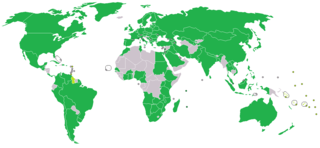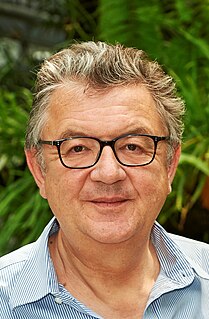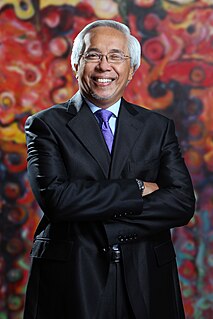
The International Council for Science was an international non-governmental organization devoted to international cooperation in the advancement of science. Its members were national scientific bodies and international scientific unions.
Diversitas was an international research programme aiming at integrating biodiversity science for human well-being. In December 2014 its work was transferred to the programme called Future Earth, which was sponsored by the Science and Technology Alliance for Global Sustainability, comprising the International Council for Science (ICSU), the International Social Science Council (ISSC), the Belmont Forum of funding agencies, the United Nations Educational, Scientific, and Cultural Organization (UNESCO), the United Nations Environment Programme (UNEP), the United Nations University (UNU) and the World Meteorological Organization (WMO).

The International Union of Biological Sciences (IUBS) is a non-profit organization and non-governmental organization, founded in 1919, that promotes the biological sciences internationally. As a scientific umbrella organization it was a founding member of the International Council for Science (ICSU).
The International Association for Hydro-Environment Engineering and Research (IAHR), founded in 1935, is a worldwide, non-profit, independent organisation of engineers and water specialists working in fields related to the hydro-environment and in particular with reference to hydraulics and its practical application. IAHR was called the International Association of Hydraulic Engineering and Research until 2009.
The Max Planck Institute of Colloids and Interfaces is located in Potsdam-Golm Science Park in Golm, Potsdam, Germany. It was founded in 1990 as a successor of the Institute for Physical Chemistry and for Organic Chemistry, both in Berlin-Adlershof, and for Polymer Chemistry in Teltow. In 1999, it transferred to newly constructed extension facilities in Golm. It is one of 80 institutes in the Max Planck Society (Max-Planck-Gesellschaft).

Seyed Ehtesham Hasnain is Distinguished Professor of Biological Sciences at the Indian Institute of Technology Delhi, an academic, science policy advisor and institution builder based in Delhi, India.
The International Society for Microbial Ecology (ISME) is the principal scientific society for the burgeoning field of microbial ecology and its related disciplines. ISME is a non-profit association and is owner of the International Symposia on Microbial Ecology and also owner of The ISME Journal which is published by Springer Nature. The ISME Office is based at the Netherlands Institute of Ecology in Wageningen, The Netherlands.

Ralf Reski is a German professor of plant biotechnology and former dean of the Faculty of Biology of the University of Freiburg. He is also affiliated to the French École supérieure de biotechnologie Strasbourg (ESBS) and Senior Fellow at the Freiburg Institute for Advanced Studies.
Rudi Balling is a German geneticist. He is the founding director of the Luxembourg Centre for Systems Biomedicine at the University of Luxembourg (2009-2021) He has served as President of the International Mammalian Genome Society and as co-editor of the Annual Review of Nutrition since 2018. In 2016 Balling received Luxembourg's Ordre de Mérite (Commandeur) from Prime Minister Xavier Bettel.
The European Association of Science Editors is a non-profit membership organisation for people interested in science communication and editing. Founded in 1982, in France, EASE now has an international membership.

Manchanahalli Rangaswamy Satyanarayana Rao known by the abbreviation M. R. S. Rao, is an Indian scientist, born on 21 January 1948 at Mysore, India. He has been awarded the fourth highest civilian award Padma Shri in Science and Engineering category by the Government of India. He was the President of Jawaharlal Nehru Centre for Advanced Scientific Research (JNCASR) in Bangalore, India (2003-2013).

The International Moss Stock Center (IMSC) is a biorepository which is specialized in collecting, preserving and distributing moss plants of a high value of scientific research. The IMSC is located at the Faculty of Biology, Department of Plant Biotechnology, at the Albert-Ludwigs-University of Freiburg, Germany.

The Faculty of Biology is one of the eleven faculties of the University of Freiburg in Freiburg im Breisgau, Baden-Württemberg, Germany. It is part of a strong life sciences network including institutions such as the Max Planck Institute of Immunobiology and Epigenetics, the Bernstein Center Freiburg (BCF), the Center for Applied Biosciences and the Center for Biological Systems Analysis, which started operations in 2008 as offspring of the Freiburg Initiative for Systems Biology (FRISYS), funded by the Federal Ministry of Education and Research (BMBF).

Tan Sri Zakri bin Abdul Hamid has had a distinguished career in science as a researcher, educator, administrator and diplomat.
Science and Engineering Research Board is a statutory body under the Department of Science and Technology, Government of India, established by an Act of the Parliament of India in 2009. The Board is chaired by the Secretary to the Government of India in the Department of Science and Technology and shall have other senior government officials and eminent scientists as members. The Board was set up for promoting basic research in science and engineering and to provide financial assistance to scientists, academic institutions, R&D laboratories, industrial concerns and other agencies for such research.

Prof. Dr Hans-Martin Hinz is a German museum professional. From 2010 to 2016 he was President of the International Council of Museums (ICOM).
The German Phytomedicine Society with headquarters in Braunschweig was founded in 1949 in Fulda and is the professional association of practitioners of phytomedicine, as successor to the Association of German Plant Physicians, which was based in Berlin from 1928 to 1937.
The German Society for Plant Sciences is a non-profit network for plant sciences and botany in the German-speaking area. It was founded 1882 at Eisenach, Germany. In July 2020 it comprises more than 900 individual members and persons working or interested in plant science. The society supports young scientists and unites all generations.

Lingadahalli Subrahmanya Shashidhara is an Indian developmental biologist, geneticist and a professor of Biology at the Indian Institute of Science Education and Research, Pune, and is currently on lien to the faculty of Biology at Ashoka University, Sonepat, India. He heads the LSS Laboratory at IISER and is known for his studies on Drosophila, particularly Evolution of appendages and functions of homeotic selector genes. He is a J. C. Bose National Fellow of the Department of Science and Technology and an elected fellow of the Indian National Science Academy, Indian Academy of Sciences and the National Academy of Sciences, India. The Council of Scientific and Industrial Research, the apex agency of the Government of India for scientific research, awarded him the Shanti Swarup Bhatnagar Prize for Science and Technology, one of the highest Indian science awards, in 2008, for his contributions to biological sciences.
The International Science Council (ISC) is an international non-governmental organization that unites scientific bodies at various levels across the social and natural sciences. The ISC was formed with its inaugural general assembly on 4 July 2018 by the merger of the former International Council for Science and the International Social Science Council (ISSC), making it one of the largest organisations of this type.